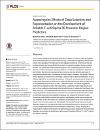Assessing the effects of data selection and representation on the development of reliable E. coli sigma 70 promoter region predictors
| المؤلف | Abbas, Mostafa M. |
| المؤلف | Mohie-Eldin, Mostafa M. |
| المؤلف | El-Manzalawy, Yasser |
| تاريخ الإتاحة | 2016-03-31T14:00:58Z |
| تاريخ النشر | 2015-03 |
| اسم المنشور | PLoS ONE |
| المصدر | Scopus |
| الاقتباس | Abbas MM, Mohie-Eldin MM, EL-Manzalawy Y (2015) Assessing the Effects of Data Selection and Representation on the Development of Reliable E. coli Sigma 70 Promoter Region Predictors. PLoS ONE 10(3): e0119721. |
| الرقم المعياري الدولي للكتاب | 1932-6203 |
| الملخص | As the number of sequenced bacterial genomes increases, the need for rapid and reliable tools for the annotation of functional elements (e.g., transcriptional regulatory elements) becomes more desirable. Promoters are the key regulatory elements, which recruit the transcriptional machinery through binding to a variety of regulatory proteins (known as sigma factors). The identification of the promoter regions is very challenging because these regions do not adhere to specific sequence patterns or motifs and are difficult to determine experimentally. Machine learning represents a promising and cost-effective approach for computational identification of prokaryotic promoter regions. However, the quality of the predictors depends on several factors including: i) training data; ii) data representation; iii) classification algorithms; iv) evaluation procedures. In this work, we create several variants of E. coli promoter data sets and utilize them to experimentally examine the effect of these factors on the predictive performance of E. coli σ70 promoter models. Our results suggest that under some combinations of the first three criteria, a prediction model might perform very well on cross-validation experiments while its performance on independent test data is drastically very poor. This emphasizes the importance of evaluating promoter region predictors using independent test data, which corrects for the over-optimistic performance that might be estimated using the cross-validation procedure. Our analysis of the tested models shows that good prediction models often perform well despite how the non-promoter data was obtained. On the other hand, poor prediction models seems to be more sensitive to the choice of non-promoter sequences. Interestingly, the best performing sequence-based classifiers outperform the best performing structure-based classifiers on both cross-validation and independent test performance evaluation experiments. Finally, we propose a meta-predictor method combining two top performing sequence-based and structure-based classifiers and compare its performance with some of the state-of-the-art E. coli σ70 promoter prediction methods. |
| راعي المشروع | NPRP grant No. 4-1454-1-233 from the Qatar National Research Fund (a member of Qatar Foundation). |
| اللغة | en |
| الناشر | Public Library of Science |
| الموضوع | Escherichia coli genetic variability information processing promoter region reliability sequence analysis sigma 70 promoter region validation process Bacteria (microorganisms) Prokaryota |
| النوع | Article |
| رقم العدد | 3 |
| رقم المجلد | 10 |
الملفات في هذه التسجيلة
هذه التسجيلة تظهر في المجموعات التالية
-
الابحاث المتعددة التخصصات والتصاميم االذكية [32 items ]


